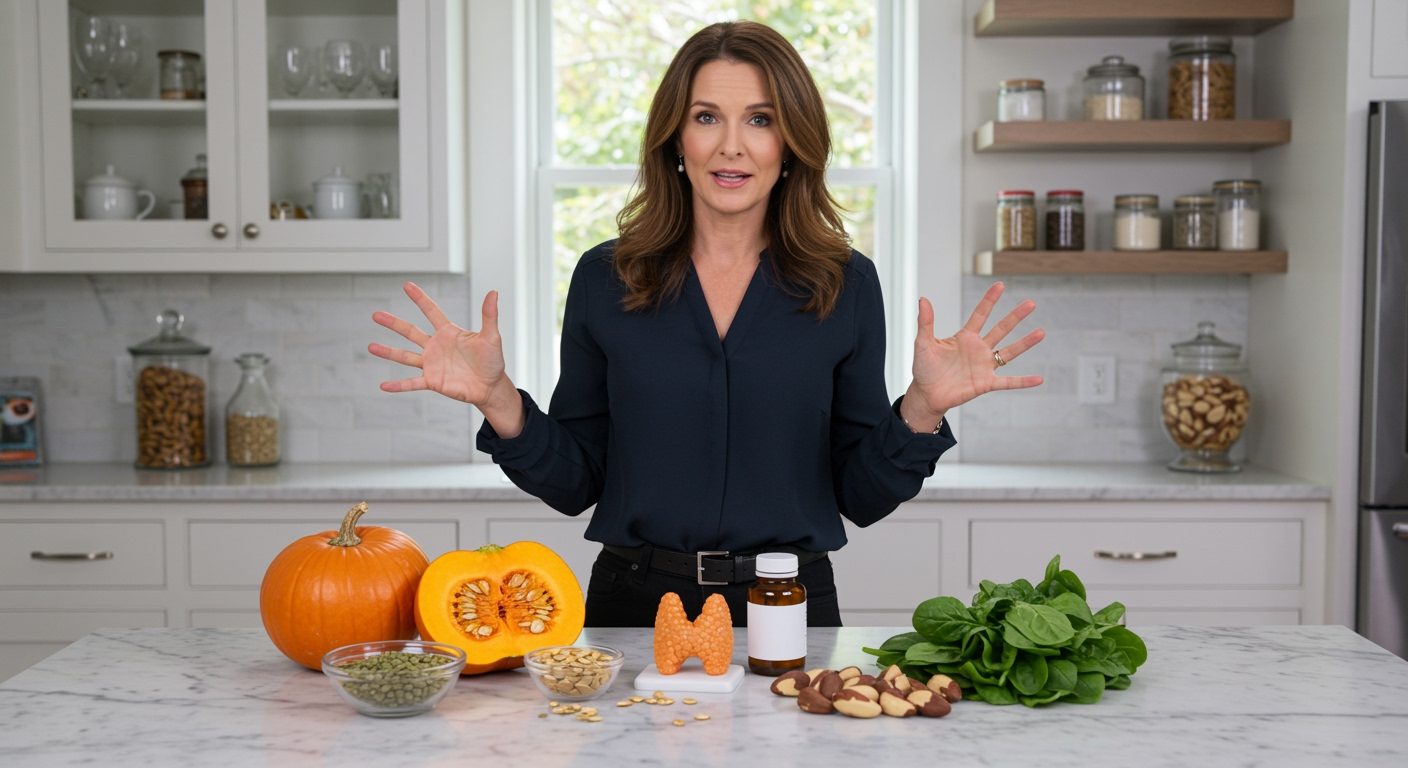✪ Key Takeaway: Pumpkin seeds may support thyroid function through zinc and selenium, but pumpkin flesh alone cannot treat hypothyroidism.
Introduction
You have probably heard someone say that pumpkin is a miracle food for thyroid problems.
You might be wondering if adding this orange vegetable to your diet can actually fix your sluggish thyroid or reduce your medication needs.
Hi, I am Abdur, your nutrition coach and today I am going to explain exactly what pumpkin can and cannot do for hypothyroidism based on scientific evidence.
What Nutrients in Pumpkin Matter for Thyroid Health?
Pumpkin contains several nutrients that play roles in thyroid hormone production and metabolism.
The flesh provides vitamin A in the form of beta-carotene, which supports overall immune function and cellular health.
Pumpkin seeds are where the real thyroid-supporting nutrients live, particularly zinc and selenium.
Zinc is essential for converting the inactive thyroid hormone T4 into the active form T3 that your body actually uses.
Selenium protects your thyroid gland from oxidative damage and is necessary for the enzymes that produce thyroid hormones.
Research shows that zinc deficiency can impair thyroid hormone synthesis and worsen hypothyroid symptoms.
However, eating pumpkin alone will not provide therapeutic amounts of these minerals needed to correct a deficiency.
✪ Fact: One ounce of pumpkin seeds provides about 2.2 mg of zinc, which is roughly 20 percent of your daily requirement.
Can Pumpkin Actually Improve Thyroid Function?
The short answer is that pumpkin cannot directly treat or cure hypothyroidism.
Hypothyroidism is a medical condition where your thyroid gland does not produce enough hormones, often due to autoimmune destruction or other underlying causes.
No single food can reverse this condition or replace the need for thyroid hormone medication when prescribed by your doctor.
What pumpkin can do is support your overall nutritional status, which indirectly helps your thyroid function better.
If you have mild nutrient deficiencies in zinc or selenium, adding pumpkin seeds to a balanced diet may help correct those gaps.
Studies indicate that adequate zinc and selenium status is associated with better thyroid hormone levels and reduced inflammation.
But this benefit only applies if you were deficient in the first place, and pumpkin is just one of many food sources for these minerals.
✪ Note: Never stop or reduce your thyroid medication without consulting your healthcare provider, regardless of dietary changes.
Does Pumpkin Have Any Negative Effects on Thyroid Health?
Pumpkin is generally safe for people with hypothyroidism and does not contain goitrogenic compounds.
Goitrogens are substances found in certain foods like raw cruciferous vegetables that can interfere with thyroid hormone production.
Since pumpkin does not have these compounds, you can eat it freely without worrying about worsening your thyroid function.
The only potential concern is if you consume excessive amounts of pumpkin seeds, which are calorie-dense and high in fat.
Overeating any food, including healthy ones, can lead to unwanted weight gain, which is already a challenge for many people with hypothyroidism.
Some people also experience digestive discomfort from eating too many seeds due to their fiber content.
Moderation is key, and a small handful of pumpkin seeds daily is a reasonable amount for most people.
✪ Pro Tip: Roast pumpkin seeds with a pinch of sea salt for a crunchy, thyroid-friendly snack that satisfies without excess calories.
What Other Foods Should You Include for Thyroid Support?
Managing hypothyroidism through diet requires a broader approach than just adding one or two foods.
You need adequate iodine, which is the building block of thyroid hormones and found in iodized salt, seafood, and dairy products.
However, too much iodine can also be problematic, especially if you have autoimmune thyroid disease like Hashimoto thyroiditis.
Focus on getting enough protein from sources like eggs, fish, chicken, and legumes to support overall metabolism.
Include foods rich in selenium like Brazil nuts, which provide more selenium per serving than pumpkin seeds.
Iron is another important mineral because deficiency can worsen fatigue and other hypothyroid symptoms.
A balanced diet with plenty of vegetables, fruits, whole grains, lean proteins, and healthy fats will serve your thyroid health better than any single superfood.
✪ Fact: Just two Brazil nuts daily can provide your entire daily selenium requirement, making them one of the most concentrated sources.
How Should You Incorporate Pumpkin Into Your Diet?
You can enjoy pumpkin in both its flesh and seed forms as part of a varied diet.
Roasted pumpkin makes a delicious side dish, and you can add it to soups, stews, or curries for extra flavor and nutrition.
Pumpkin puree works well in smoothies, oatmeal, or even as a base for healthy desserts.
For pumpkin seeds, you can sprinkle them on salads, yogurt, or eat them as a standalone snack.
Avoid heavily salted or sugared versions of pumpkin seeds, as these add unnecessary sodium and calories.
Raw or lightly roasted seeds retain more of their nutritional value compared to heavily processed versions.
Remember that pumpkin is just one piece of the puzzle, and your overall eating pattern matters more than any individual food.
✪ Pro Tip: Blend cooked pumpkin with coconut milk and warming spices like cinnamon for a comforting, thyroid-friendly soup.
The Bottom Line
Pumpkin, especially its seeds, can support thyroid health through zinc and selenium, but it is not a cure for hypothyroidism.
No single food can replace proper medical treatment, but every nutritious choice you make builds a foundation for better health.
If you have questions about managing hypothyroidism through diet or want to share your experience with pumpkin, please leave a comment below.
References
At NutritionCrown, we use quality and credible sources to ensure our content is accurate and trustworthy. Below are the sources referenced in writing this article:
- PMC: Zinc and Thyroid Function
- PMC: Selenium and Thyroid Health
- Healthline: Hypothyroidism Diet
- WebMD: Health Benefits of Pumpkin





